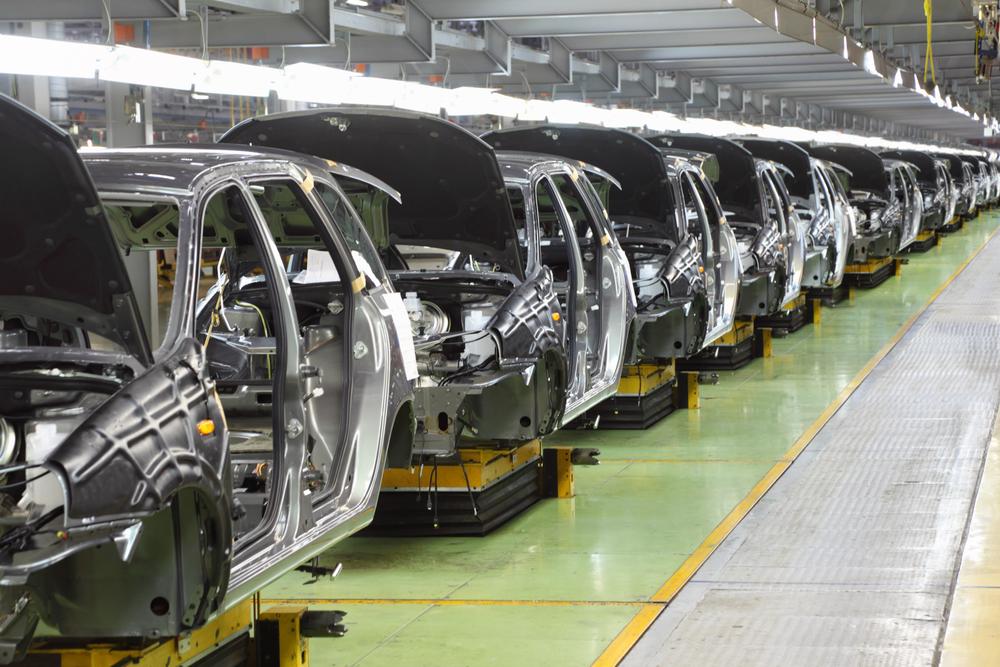A set of newly-released figures by the Society of Motor Manufacturers and Traders Ltd (SMMT) demonstrate the devastating impact that the coronavirus pandemic has had on the automotive manufacturing industry.
Car production was down 95.4% in May 2020 on the previous year, with just 5,314 cars produced compared to 116,035 during the same month in 2019. Exports have also taken a hard hit, down 95.5% to just 4,260 from last year’s 93,860.
The report emerges in the wake of The UK in a Changing Europe’s analysis from earlier this week, predicting that Brexit will have a “negative and significant” impact on the manufacturing sector – which is still scrambling to recover from the market paralysis due to lockdown restrictions and social distancing measures.
The coronavirus crunch
Strict lockdown measures during the peak of the pandemic left the manufacturing industry at a stand-still with millions of workers on furlough and production mostly on hold between March and May. The SMMT previously warned that up to 1 in 6 jobs may be at risk when the government’s furlough scheme wraps up in October, if the industry does not receive any additional financial support during the weaning process.
Many automotive factories across the UK have reopened in June with reduced output. But 6,000 job cuts have been announced this month already, and with 1 in 3 staff from the industry still on furlough, the SMMT is calling for the government to reduce VAT as the sector falls into “critical need” of extra funds to prevent further job losses.
Brexit’s long shadow
Beyond coronavirus, the looming threat of Brexit casts a long shadow over the automotive sector. The SMMT’s figures show that the EU makes up a 54.8% market share of UK car exports. With swirling rumours that PM Boris Johnson is leaning towards a no-deal scenario, the manufacturing industry is preparing itself for more hardship down the line once the metaphorical rug is swept out from beneath its feet.
Peter Barnes, Insurance Partner and Head of Automotive at global legal business DWF, commented on today’s SMMT’s manufacturing figures for May 2020:
“While the world has quite correctly been focused on the impact of the pandemic, which has consumed every inch of capability and capacity in the automotive market, the issues which would be created by a hard Brexit in the automotive sector remain extremely real in these unprecedented times”.
He joins the chorus of professionals in the automotive industry urging the government to implement further measures after the furlough scheme terminates later this year.
“Given that the UK automotive sector is fundamentally stable with a skill set admired globally, the unprecedented vital government assistance which has been provided to keep many businesses afloat needs to go further.
“There remains hope that a car scrappage scheme enticing those with older vehicles back to car showrooms combined with a cut in VAT could make all the difference”.
However, the industry’s future very much depends on the outcome of UK-EU negotiations, as the deadline for a Brexit deal approaches on the 31st of October. The ideal scenario for manufacturers would involve a free trade agreement with the EU, extending the current “no friction” trade with the continent and enabling a full recovery with output back to pre-crisis levels by 2025.
“It is hoped that the results of such negotiations will secure a comprehensive free trade agreement with the EU that maintains tariff and quota-free trade”.
A world-class industry
It is not all doom and gloom though, as Barnes emphasises that the the industry has every chance to make a full recovery given the right aids.
“The automotive sector in the UK has been hit with extreme uncertainty over the last few years as a result of both the withdrawal from the European Union and the global pandemic of COVID-19. However, the sector is truly world-class. It is hoped that, with appropriate support and financing from the government, the figures released today from the SMMT will continue to demonstrate a rise month on month as output levels and demand increases”.

